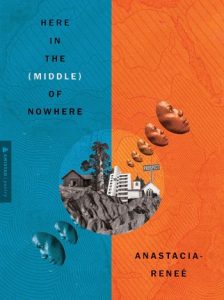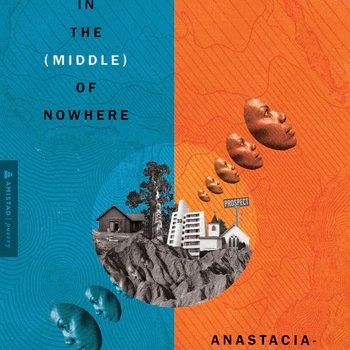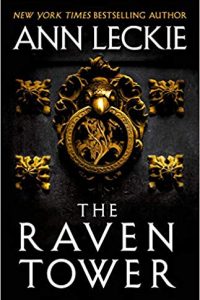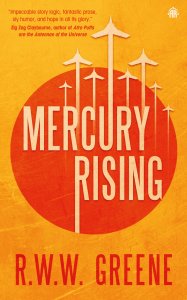Ian Mond Reviews Here in the (Middle) of Nowhere by Anastacia Reneé
 Here in the (Middle) of Nowhere, Anastacia Reneé (Amistad 978-0-06322-168-0, $17.99, 144pp, tp) March 2024.
Here in the (Middle) of Nowhere, Anastacia Reneé (Amistad 978-0-06322-168-0, $17.99, 144pp, tp) March 2024.
I’ve never really seen eye to eye with poetry. As a kid, all that word-play, metaphor, and allusion seemed like hard work, especially when my literary diet consisted mainly of Terrance Dicks Doctor Who novelisations and Stephen King. But in the last decade I’ve made a concerted effort to read outside my comfort zone – starting with literary, rather than genre, fiction – discovering a taste for work where language precedes story or plot. More recently, I’ve read difficult novels like Riddley Walker by Russell Hoban, Ulysses by James Joyce, and The Life and Options of Tristram Shandy, Gentleman by Laurence Sterne, and I was delighted with the experience – even the bits that went over my head. Despite all this, I’ve read next to no poetry. Time to change that with Anastacia Reneé’s fourth book, Here in the (Middle) of Nowhere, a genre-bending, electrifying blend of verse and flash fiction.
Lucile, we are told, is a god. She is also a ‘‘space shuttle ship’’ from ‘‘far, far, far away’’ who is damaged and stuck on Earth. With her ‘‘ankles bound to soil’’ and ‘‘tree-like branches on her back,’’ Lucile becomes the mother of all other luciles, women of colour with similar God-like powers who like to sit barefoot on their porch staring at their tree. Around these multiple luciles, a community, a town forms:
french-braided subdivisions & cornrowed patterns & wide city blocks of lavender, lime-green, & peach shotgun houses will appear closer in rearview mirrors. each one with its own labyrinth & lucile’s skeleton key. this is a multidimensional place, inside a town, inside a city, inside a state.
Amongst these parishes, these villages, these worlds spread across the multiverse, we encounter a postapocalyptic reality where a person can choose to be anything for 48 hours, the eclectic residents of an apartment building located in the 33rd underground, and the Black girl vampire lisa’s first date with a circumstantial zombie.
Because I read along with the Backlisted podcast – the greatest literary podcast on the interwebs – I’ve recently finished Basil Bunting’s long poem Briggflats. Bunting was famous for declaring that poetry must be read aloud and that, like music, it is meant to be heard. And while I know Bunting’s aural take on poetry is contested, there’s no doubt that the poetry and prose in Here in the (Middle) of Nowhere is all the richer if you recite it. To be clear, the book can be read silently; it’s how I first approached the work. But I found when I spoke the poems (because, yes, I went back for a second serving the moment I’d finished the first), there was a rhythm and beat to Reneé’s use of language that brought a level of clarity to the work that wasn’t so much hidden as muted. Take a piece like ‘‘sharp’’ (‘‘we grew fangs in the absence of hugs. every/opportunity to touch grew a fang/every opportunity to talk grew a fang…’’) or the astonishing ‘‘Everybody Gets a Solo in the Choir of Grief’’ (‘‘grieving makes you hangry/makes you scarf the skin off your bones, makes you/pick hindsight from/ your wisdom teeth…’’), which I didn’t pay enough attention to on my first read, but became favourite pieces after I’d read them aloud.
Reneé’s poetry and flash fiction runs the whole emotional gamut. Their sense of humour is a lovely mix of the wry, the self-aware, and the cheeky. I dare you not to grin after reading the ‘‘Unknown Saints’’, which lists the saints revered by lucile’s community, like Sylvia, the saint of lipstick, and Dee, the saint of accessories. Reneé’s appreciation of the surreal also elicits a smile, whether it’s the birth of luther, emerging out of a toaster oven surrounded by ‘‘black electric cyclops’’ midwives connected to rocking chairs, or the intricate directions to the 33rd Underground, or the Muslim circumstantial zombie who loves bacon. Threaded through this weirdness are Reneé’s canny observations of human nature (‘‘humans suck on grudges like peppermint candy,’’ or ‘‘life is both flecks of horror & delight’’) and their commentary on class and race relations (white flight, white guilt, and a brilliantly caustic piece on the difference between the elite and the ‘‘dissed-elite’’). And there’s sadness and pain, such as the aforementioned and remarkable ‘‘Everybody Gets a Solo in the Choir of Grief’’, or hyacinth’s apartment in the 33rd Underground, ‘‘lavishly decorated with grief,’’ but also misspent desire, like glenda the good witch’s longing to be a Black vampire girl, or the unsent love poems and messages between essie and laverne, no longer living in the same reality. What comes from all of these stories, bound together by lucile and her sisters, is a sense of community saturated with tenderness, disappointment, pain and happiness. It’s marvellous.
Ian Mond loves to talk about books. For eight years he co-hosted a book podcast, The Writer and the Critic, with Kirstyn McDermott. Recently he has revived his blog, The Hysterical Hamster, and is again posting mostly vulgar reviews on an eclectic range of literary and genre novels. You can also follow Ian on Twitter (@Mondyboy) or contact him at mondyboy74@gmail.com.
This review and more like it in the February 2024 issue of Locus.
 While you are here, please take a moment to support Locus with a one-time or recurring donation. We rely on reader donations to keep the magazine and site going, and would like to keep the site paywall free, but WE NEED YOUR FINANCIAL SUPPORT to continue quality coverage of the science fiction and fantasy field.
While you are here, please take a moment to support Locus with a one-time or recurring donation. We rely on reader donations to keep the magazine and site going, and would like to keep the site paywall free, but WE NEED YOUR FINANCIAL SUPPORT to continue quality coverage of the science fiction and fantasy field.
©Locus Magazine. Copyrighted material may not be republished without permission of LSFF.








